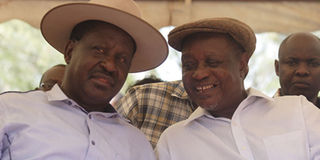
Politics
Premium
How inheritance of elective seats is cementing political families
That politics in Kenya has partly become a family business is not in doubt. Every election year, or in a by-election, Kenyans are treated to faces of new entrants, either seeking to succeed their relatives, or inherit seats left vacant after the previous office holders, mostly their relatives, die.
In Garissa county, politicians drawn from the North-Eastern region endorsed the son of the late Garissa senator Yusuf Haji, Mr Abdul Haji, to take over the senate seat, after a consensus meeting between clans in the region.

Abdul Haji during a past interview.
Led by Garissa governor Ali Korane and Eldas MP Adan Keynan, the leaders said the decision was in honour of the late senator – a respected member of the county before he died aged 80.
But the younger Haji is not the only case. Across the country, Kenyans have, time and again, been asked to vote in relatives or surrogates of politicians who died while in office, or retired to continue their legacies, or to fulfil their visions.
And while some of these cases – like in the Garissa case – have mostly been tied to the fulfilment of legacies, a majority have been cases of politicians asking for sympathy votes.
Besides the younger Haji, another recent case is the Msambweni by-election, where independent candidate Feisal Bader, a nephew of the area’s late MP – Suleiman Dori – was voted in to succeed him.

Feisal Bader.
In the Machakos by-election, the Wiper party has nominated Agnes Kavindu Muthama, wife of former Machakos senator Johnson Muthama, to succeed Senator Boniface Kabaka who died in December last year after a short illness.
And in the Bonchari by-election, the United Democratic Alliance party – a political outfit associated with Deputy President William Ruto, has settled on Ms Teresa Bitutu, wife of the area’s late MP John Oyioka, to succeed him in the mini election scheduled for May 18.

Wiper Machakos County Senatorial by-elections candidate Agnes Kavindu Muthama speaking at the AIC Kasina Church, Mlolongo on January 17, 2021.
But these are not the only cases. The practice, which many pundits have often termed selfish, and aimed at keeping power and influence in a few hands, dates back to post-independence Kenya, when influential families often rewarded, or endorsed their relatives to either inherit or succeed them.
Take for instance, the case of Amani National Congress leader Musalia Mudavadi, who following the death of his father Moses Mudavadi – a former powerful Cabinet minister in the late President Daniel Moi’s government – in 1989, was elected unopposed to the Sabatia parliamentary seat to succeed his late father.
The younger Mudavadi would later serve in various key positions in government, even going on to serve as the country’s seventh vice-president, albeit for a short period, before being elevated to the position of deputy prime minister in the grand coalition government.
The late Bomet governor Joyce Laboso, succeeded her sister Lorna Laboso as Sotik MP in 2008, following the death of the latter in a plane crash.

Former Bomet Governor Joyce Laboso.
Mrs Beatrice Kones had also first elected MP following the death of her husband former Cabinet minister Kipkalya Kones in the plane crash in Enoosupukia, Narok. Kones died alongside Lorna Laboso.
In 2017, the Bomet East parliamentary seat contest was a battle between the first born son of the late Kones and her mother.
Mrs Kones however trounced her son to recapture the seat she had lost in 2013 to Mr Benard Bett.
For many years since independence, the constituency seat has revolved around the Kones and Isaac Kipkorir Salat’s families.

Beatrice Kones at Bomet Green Stadium.
Salat served as assistant minister in then President Moi’s government. Salat, the father of Kanu Secretary-General Nick Salat, was the area MP from 1979 till his death in 1987.
Mr Kones would succeed him a year later until his death when his wife won the seat in a by-election.
In Homa Bay county, Senator Moses Kajwang also won the endorsement of the ODM party to succeed his brother Otieno Kajwang, who died after a short illness in 2014.

Moses Kajwang addresses journalists on December 8, 2014.
And in Kitui, Edith Nyenze, wife of former Kitui West MP Francis Nyenze was nominated by the Wiper party and later elected to succeed her husband who died of cancer at age of 60 in 2017.
Vihiga Senator George Khaniri was also picked in 1996 by President Moi to succeed his father as the MP for Hamisi Constituency in a by-election at the age of 21 on a Kanu ticket.
And then there is Makueni senator Mutula Kilonzo Jr, who succeeded his father, Mutula Kilonzo as the senator of Makueni, after he died in 2013.

Makueni Governor Mutula Kilonzo Junior.
Former Labour minister Ahmed Mohamed Khalif, who died in a plane crash in 2003, was also succeeded by his son Mohamed Khalif.
Prof Winnie Mitullah, a political analyst and lecturer at the University of Nairobi, said the trend has mostly been tied to an age-old tradition by political families to retain power within the household.
The political analyst said that for many, especially politicians in Kenya, power and influence is a commodity few would wish to let go of, hence the rise of the so-called political arrangements.
She, however, cautions that the trend, has in the process, locked many deserving Kenyans out of elective and key positions in government.
“What we need to understand is that this practice is a very selfish endeavour by our political elite, mostly those keen on retaining power and influence within their reach. And it is a practice that we have even seen political parties entrench.”
“Most of these parties, basically leverage on the influences they have built over time, for their advantage, but in the process, we see a lot of deserving, and much more qualified candidates locked out because they do not have the power to influence decisions,” said Prof Mitullah.
Some of the country’s most influential political families, have often come under sharp criticism for influencing the nomination of their relatives or friends to key positions in government.
ODM leader Raila Odinga, for instance, came under criticism from a number of his supporters and critics over the nomination of his relatives and friends to various elective positions.

ODM leader Raila Odinga (left) and his elder brother Oburu Odinga.
In 2019, MR Odinga was accused of influencing the nomination of his eldest daughter Rosemary Odinga to take up the Kibra seat that was left vacant by the late MP Ken Okoth, but which was later inherited by his brother Imran Okoth, in yet another case of keeping politics within the family.

ODM leader Raila Odinga with Bernard 'Imran' Okoth during campaigns on November 2, 2019.
Wiper Leader Kalonzo Musyoka’s son, MR Kennedy Musyoka, also secured a nomination to the East African Legislative Assembly, where he serves alongside Mr Odinga’s elder brother, Oburu Oginga.





